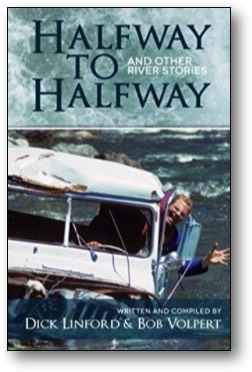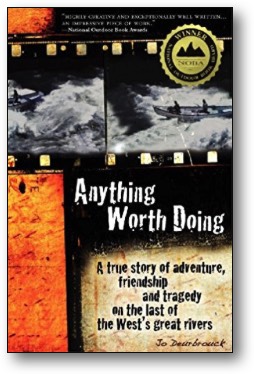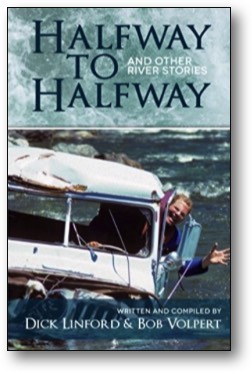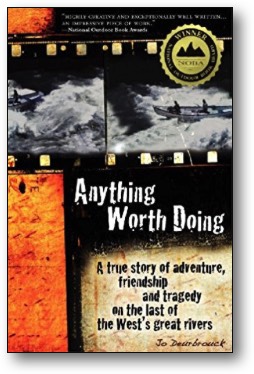Down the River in the La-Z-Boy
by Kathleen Meyer
December 2012
December 2012
With the cataract roar of holiday shopping upon us, Hanukkah already in full swing, Christmas and Kwanzaa just around the bend, here are two dandy gift ideas—new nonfiction steeped in river running, perfect for family and friends. In both, the river of main feature is Idaho’s grand dame, the Salmon.
Wishing you all a bundle of seasonal cheer, plenty of snow, and a wet, wild, heady—as in running rivers, not surviving hurricanes—healthy and happy and prosperous New Year!
Wishing you all a bundle of seasonal cheer, plenty of snow, and a wet, wild, heady—as in running rivers, not surviving hurricanes—healthy and happy and prosperous New Year!

Halfway to Halfway: And
Other River Stories
Other River Stories
—written and compiled by Dick Linford and Bob Volpert
Halfway to Halfway gives us a boatload of tall true tales, hilarious to poignant, springing from the company annals of two long-established outfitters of whitewater rafting. Altogether, it delivers an inside slice—wider than you might expect ever to be unveiled—of the fabled, rock ‘n’ rock lives of professional river rats, and their clientele whom trying to please sometimes proves more hairy than running rapids. Learn how baseball, football, a Vice President of the United States, the evolving roles of women, elephants, ghosts, underwear rituals . . . sex, drugs, and alcohol fit into the subculture of commercial rafting.
The book is written completely by guides and outfitters, only a few of whom have previously published. But lo! We find they can not only row, paddle, cook gourmet over a campfire, and shit in the woods (oops, no more—fancy portable potties are now standard fare), they can, as it happens, write! And well. Their stories range up and down the river and off, from ones marinated in loosey-goosey deeds to those laced in sweet, traditional mores; from an outfitter’s worries about a lawsuit to an outfitter’s driving pantless; from thrills spun with ribald superlatives to touching eulogies for river family now departed from our watery flow.
Halfway to Halfway is a great read for anyone who has guided, and everyone who hasn’t. Look closely and you might see yourself.
The book is written completely by guides and outfitters, only a few of whom have previously published. But lo! We find they can not only row, paddle, cook gourmet over a campfire, and shit in the woods (oops, no more—fancy portable potties are now standard fare), they can, as it happens, write! And well. Their stories range up and down the river and off, from ones marinated in loosey-goosey deeds to those laced in sweet, traditional mores; from an outfitter’s worries about a lawsuit to an outfitter’s driving pantless; from thrills spun with ribald superlatives to touching eulogies for river family now departed from our watery flow.
Halfway to Halfway is a great read for anyone who has guided, and everyone who hasn’t. Look closely and you might see yourself.
2012; Halfway Publishing, Bend, OR; $18.95
* In the interest of transparency: I rowed for Bob Volpert as a fly-fishing guide (not knowing a bobber from a wooly bugger) in the early 1970’s in British Columbia on the Quesnel, Cariboo, Chilcotin, and Fraser.


Anything Worth Doing: a true story of adventure, friendship, and tragedy on the last of the West’s great rivers
—by Jo Duerbrouck
In writing Anything Worth Doing, author Jo Deurbrouck, a professional river guide of fairly extreme water in her own right, serves up a new classic for the shelves of wild-born adventure—a deep and watery biographical account as affecting as a high-water Maytagging sous hole (I read it a month ago and it still hasn’t kicked me loose). Her narrative begins as a slow meander amid calm, elusive currents, then picks up speed in the way tributaries gorged with snow-melt swell a river to raging. The reader pushes off the bank having met legendary boatman Clancy Reece—who lives life on his own terms, prizing his uncomplicated freedom, following his passion, chasing his motto “anything worth doing is worth overdoing”—and also knowing he dies on a peak-water run. Clearly, Clancy lives and dies by his motto. It was FDR who once said “In the truest sense, freedom cannot be bestowed; it must be achieved.” Clancy, in all ways, set about achieving his determined world.
Extreme sports nowadays, or what on rivers is an extreme-peak-run (the moment of highest water in an extreme mega-water year), are a pool of different alligators—certainly different than the water I rowed, which was some of the biggest in my day—and only now attempted, with a scrap of sanity aboard, because of huge advances in gear. And a passel more guts? After my maiden whitewater run (California’s South Fork of the American), after quaking all the while inside my bikini—those were different back then, too—at the thought of finally coming upon (or maybe missing) the infamous hilltop Lollypop Tree, the signal that Satan’s Cesspool lay smack ahead, I corralled my fear with the notion I wouldn’t allow it to control my life. Would I have jumped out of an airplane? With nothing but hard ground and the Grim Reaper waiting for one mistake? Never. Our Western rivers are pool-and-drop. Although the drops can be major and technical, the waves mammoth and jumbled, the holes and eddies flippers and keepers, I could nonetheless place faith in my skills of reading water and wielding oars (the latter begun in wooden rowboats on saltwater inlets at age seven) and in the knowledge of pools. After reading Anything Worth Doing, I’m wondering if I ever really pushed any limits but my own, which, by the way, was the whole point. I rowed always knowing the river was mightier; that you only ran with her. It never occurred to me I might be engaged in anything overly rash. Only a dance upon water.
Was Clancy, in his last enormous quest, pools ripping along like a freight train of froth, feeling much the same?
In the past few days, my gut has shifted as if it were progressing through Kübler-Ross’s stages of grief, which perhaps is somewhat connection to a crush I had at eleven on a boy named Clancy Boynton. In any case, I’m bouncing back and forth between Stage Two and Stage Four: pissed and depressed. Though I’ve met Clancy Reece only on the pages of Deurbrouck’s book, my feelings are fervent and include a core shudder of Would that, in different times, have been me? And a glimpse of Death indeed lurks close every day. And my more frequent ponder: Is it merely luck that’s blessed me with ripe old age instead of—bam!—flattened me by a truck? These circular thoughts stem from one of Reece’s seemingly small decisions—whether it arose from nobility of choice, rigidity in motto, insufficient planning, perhaps a bout of temporary stupidity, weariness from long preparation and anticipation, or something else, something suicidal, that I missed between the covers of the book, I don’t know. To my mind, it was this decision, this action, this non-action that sealed his fate. Upon first read, the words hit me like a poison dart, and yet I shoved them aside, insanely hoping for a reversal. This is not to say that one change in approach and Clancy would have come through alive; there were a thousand ways he could have died that day. Any alteration would have set off a string more. But I’m curious now if anyone else at this juncture in the story caught a bucket of ice water? So let me know. Meanwhile, I’m headed for a reread. And making it to Stage Five.
It’s to Jo Deurbrouck’s credit as a writer that she keeps the reader in extreme wild thrall all along the ride to the known finish. And to have set out otherwise would have been a cheap trick.
Extreme sports nowadays, or what on rivers is an extreme-peak-run (the moment of highest water in an extreme mega-water year), are a pool of different alligators—certainly different than the water I rowed, which was some of the biggest in my day—and only now attempted, with a scrap of sanity aboard, because of huge advances in gear. And a passel more guts? After my maiden whitewater run (California’s South Fork of the American), after quaking all the while inside my bikini—those were different back then, too—at the thought of finally coming upon (or maybe missing) the infamous hilltop Lollypop Tree, the signal that Satan’s Cesspool lay smack ahead, I corralled my fear with the notion I wouldn’t allow it to control my life. Would I have jumped out of an airplane? With nothing but hard ground and the Grim Reaper waiting for one mistake? Never. Our Western rivers are pool-and-drop. Although the drops can be major and technical, the waves mammoth and jumbled, the holes and eddies flippers and keepers, I could nonetheless place faith in my skills of reading water and wielding oars (the latter begun in wooden rowboats on saltwater inlets at age seven) and in the knowledge of pools. After reading Anything Worth Doing, I’m wondering if I ever really pushed any limits but my own, which, by the way, was the whole point. I rowed always knowing the river was mightier; that you only ran with her. It never occurred to me I might be engaged in anything overly rash. Only a dance upon water.
Was Clancy, in his last enormous quest, pools ripping along like a freight train of froth, feeling much the same?
In the past few days, my gut has shifted as if it were progressing through Kübler-Ross’s stages of grief, which perhaps is somewhat connection to a crush I had at eleven on a boy named Clancy Boynton. In any case, I’m bouncing back and forth between Stage Two and Stage Four: pissed and depressed. Though I’ve met Clancy Reece only on the pages of Deurbrouck’s book, my feelings are fervent and include a core shudder of Would that, in different times, have been me? And a glimpse of Death indeed lurks close every day. And my more frequent ponder: Is it merely luck that’s blessed me with ripe old age instead of—bam!—flattened me by a truck? These circular thoughts stem from one of Reece’s seemingly small decisions—whether it arose from nobility of choice, rigidity in motto, insufficient planning, perhaps a bout of temporary stupidity, weariness from long preparation and anticipation, or something else, something suicidal, that I missed between the covers of the book, I don’t know. To my mind, it was this decision, this action, this non-action that sealed his fate. Upon first read, the words hit me like a poison dart, and yet I shoved them aside, insanely hoping for a reversal. This is not to say that one change in approach and Clancy would have come through alive; there were a thousand ways he could have died that day. Any alteration would have set off a string more. But I’m curious now if anyone else at this juncture in the story caught a bucket of ice water? So let me know. Meanwhile, I’m headed for a reread. And making it to Stage Five.
It’s to Jo Deurbrouck’s credit as a writer that she keeps the reader in extreme wild thrall all along the ride to the known finish. And to have set out otherwise would have been a cheap trick.
2012; Sundog Book Publishing, Idaho Falls, ID; $15.00



Please bare with; I’m in the process of transferring the Archives and Comments to this new site, and finishing mobile compatibility.
Down the River in the La-Z-Boy
by Kathleen Meyer
December 2012
December 2012
With the cataract roar of holiday shopping upon us, Hanukkah already in full swing, Christmas and Kwanzaa just around the bend, here are two dandy gift ideas—new nonfiction steeped in river running, perfect for family and friends. In both, the river of main feature is Idaho’s grand dame, the Salmon.
Wishing you all a bundle of seasonal cheer, plenty of snow, and a wet, wild, heady—as in running rivers, not surviving hurricanes—healthy and happy and prosperous New Year!
Wishing you all a bundle of seasonal cheer, plenty of snow, and a wet, wild, heady—as in running rivers, not surviving hurricanes—healthy and happy and prosperous New Year!

Halfway to Halfway: And Other River Stories
—written and compiled by Dick
Linford and Bob Volpert
Halfway to Halfway gives us a boatload of tall true tales, hilarious to poignant, springing from the company annals of two long-established outfitters of whitewater rafting. Altogether, it delivers an inside slice—wider than you might expect ever to be unveiled—of the fabled, rock ‘n’ rock lives of professional river rats, and their clientele whom trying to please sometimes proves more hairy than running rapids. Learn how baseball, football, a Vice President of the United States, the evolving roles of women, elephants, ghosts, underwear rituals . . . sex, drugs, and alcohol fit into the subculture of commercial rafting.
The book is written completely by guides and outfitters, only a few of whom have previously published. But lo! We find they can not only row, paddle, cook gourmet over a campfire, and shit in the woods (oops, no more—fancy portable potties are now standard fare), they can, as it happens, write! And well. Their stories range up and down the river and off, from ones marinated in loosey-goosey deeds to those laced in sweet, traditional mores; from an outfitter’s worries about a lawsuit to an outfitter’s driving pantless; from thrills spun with ribald superlatives to touching eulogies for river family now departed from our watery flow.
Halfway to Halfway is a great read for anyone who has guided, and everyone who hasn’t. Look closely and you might see yourself.
The book is written completely by guides and outfitters, only a few of whom have previously published. But lo! We find they can not only row, paddle, cook gourmet over a campfire, and shit in the woods (oops, no more—fancy portable potties are now standard fare), they can, as it happens, write! And well. Their stories range up and down the river and off, from ones marinated in loosey-goosey deeds to those laced in sweet, traditional mores; from an outfitter’s worries about a lawsuit to an outfitter’s driving pantless; from thrills spun with ribald superlatives to touching eulogies for river family now departed from our watery flow.
Halfway to Halfway is a great read for anyone who has guided, and everyone who hasn’t. Look closely and you might see yourself.
2012; Halfway Publishing
Bend, OR; $18.95
* In the interest of transparency: I rowed for Bob Volpert as a fly-fishing guide (not knowing a bobber from a wooly bugger) in the early 1970’s in British Columbia on the Quesnel, Cariboo, Chilcotin, and Fraser.


Anything Worth Doing: a true story of adventure, friendship, and tragedy on the last of the West’s great rivers
—by Jo Duerbrouck
In writing Anything Worth Doing, author Jo Deurbrouck, a professional river guide of fairly extreme water in her own right, serves up a new classic for the shelves of wild-born adventure—a deep and watery biographical account as affecting as a high-water Maytagging sous hole (I read it a month ago and it still hasn’t kicked me loose). Her narrative begins as a slow meander amid calm, elusive currents, then picks up speed in the way tributaries gorged with snow-melt swell a river to raging. The reader pushes off the bank having met legendary boatman Clancy Reece—who lives life on his own terms, prizing his uncomplicated freedom, following his passion, chasing his motto “anything worth doing is worth overdoing”—and also knowing he dies on a peak-water run. Clearly, Clancy lives and dies by his motto. It was FDR who once said “In the truest sense, freedom cannot be bestowed; it must be achieved.” Clancy, in all ways, set about achieving his determined world.
Extreme sports nowadays, or what on rivers is an extreme-peak-run (the moment of highest water in an extreme mega-water year), are a pool of different alligators—certainly different than the water I rowed, which was some of the biggest in my day—and only now attempted, with a scrap of sanity aboard, because of huge advances in gear. And a passel more guts? After my maiden whitewater run (California’s South Fork of the American), after quaking all the while inside my bikini—those were different back then, too—at the thought of finally coming upon (or maybe missing) the infamous hilltop Lollypop Tree, the signal that Satan’s Cesspool lay smack ahead, I corralled my fear with the notion I wouldn’t allow it to control my life. Would I have jumped out of an airplane? With nothing but hard ground and the Grim Reaper waiting for one mistake? Never. Our Western rivers are pool-and-drop. Although the drops can be major and technical, the waves mammoth and jumbled, the holes and eddies flippers and keepers, I could nonetheless place faith in my skills of reading water and wielding oars (the latter begun in wooden rowboats on saltwater inlets at age seven) and in the knowledge of pools. After reading Anything Worth Doing, I’m wondering if I ever really pushed any limits but my own, which, by the way, was the whole point. I rowed always knowing the river was mightier; that you only ran with her. It never occurred to me I might be engaged in anything overly rash. Only a dance upon water.
Was Clancy, in his last enormous quest, pools ripping along like a freight train of froth, feeling much the same?
In the past few days, my gut has shifted as if it were progressing through Kübler-Ross’s stages of grief, which perhaps is somewhat connection to a crush I had at eleven on a boy named Clancy Boynton. In any case, I’m bouncing back and forth between Stage Two and Stage Four: pissed and depressed. Though I’ve met Clancy Reece only on the pages of Deurbrouck’s book, my feelings are fervent and include a core shudder of Would that, in different times, have been me? And a glimpse of Death indeed lurks close every day. And my more frequent ponder: Is it merely luck that’s blessed me with ripe old age instead of—bam!—flattened me by a truck? These circular thoughts stem from one of Reece’s seemingly small decisions—whether it arose from nobility of choice, rigidity in motto, insufficient planning, perhaps a bout of temporary stupidity, weariness from long preparation and anticipation, or something else, something suicidal, that I missed between the covers of the book, I don’t know. To my mind, it was this decision, this action, this non-action that sealed his fate. Upon first read, the words hit me like a poison dart, and yet I shoved them aside, insanely hoping for a reversal. This is not to say that one change in approach and Clancy would have come through alive; there were a thousand ways he could have died that day. Any alteration would have set off a string more. But I’m curious now if anyone else at this juncture in the story caught a bucket of ice water? So let me know. Meanwhile, I’m headed for a reread. And making it to Stage Five.
It’s to Jo Deurbrouck’s credit as a writer that she keeps the reader in extreme wild thrall all along the ride to the known finish. And to have set out otherwise would have been a cheap trick.
Extreme sports nowadays, or what on rivers is an extreme-peak-run (the moment of highest water in an extreme mega-water year), are a pool of different alligators—certainly different than the water I rowed, which was some of the biggest in my day—and only now attempted, with a scrap of sanity aboard, because of huge advances in gear. And a passel more guts? After my maiden whitewater run (California’s South Fork of the American), after quaking all the while inside my bikini—those were different back then, too—at the thought of finally coming upon (or maybe missing) the infamous hilltop Lollypop Tree, the signal that Satan’s Cesspool lay smack ahead, I corralled my fear with the notion I wouldn’t allow it to control my life. Would I have jumped out of an airplane? With nothing but hard ground and the Grim Reaper waiting for one mistake? Never. Our Western rivers are pool-and-drop. Although the drops can be major and technical, the waves mammoth and jumbled, the holes and eddies flippers and keepers, I could nonetheless place faith in my skills of reading water and wielding oars (the latter begun in wooden rowboats on saltwater inlets at age seven) and in the knowledge of pools. After reading Anything Worth Doing, I’m wondering if I ever really pushed any limits but my own, which, by the way, was the whole point. I rowed always knowing the river was mightier; that you only ran with her. It never occurred to me I might be engaged in anything overly rash. Only a dance upon water.
Was Clancy, in his last enormous quest, pools ripping along like a freight train of froth, feeling much the same?
In the past few days, my gut has shifted as if it were progressing through Kübler-Ross’s stages of grief, which perhaps is somewhat connection to a crush I had at eleven on a boy named Clancy Boynton. In any case, I’m bouncing back and forth between Stage Two and Stage Four: pissed and depressed. Though I’ve met Clancy Reece only on the pages of Deurbrouck’s book, my feelings are fervent and include a core shudder of Would that, in different times, have been me? And a glimpse of Death indeed lurks close every day. And my more frequent ponder: Is it merely luck that’s blessed me with ripe old age instead of—bam!—flattened me by a truck? These circular thoughts stem from one of Reece’s seemingly small decisions—whether it arose from nobility of choice, rigidity in motto, insufficient planning, perhaps a bout of temporary stupidity, weariness from long preparation and anticipation, or something else, something suicidal, that I missed between the covers of the book, I don’t know. To my mind, it was this decision, this action, this non-action that sealed his fate. Upon first read, the words hit me like a poison dart, and yet I shoved them aside, insanely hoping for a reversal. This is not to say that one change in approach and Clancy would have come through alive; there were a thousand ways he could have died that day. Any alteration would have set off a string more. But I’m curious now if anyone else at this juncture in the story caught a bucket of ice water? So let me know. Meanwhile, I’m headed for a reread. And making it to Stage Five.
It’s to Jo Deurbrouck’s credit as a writer that she keeps the reader in extreme wild thrall all along the ride to the known finish. And to have set out otherwise would have been a cheap trick.
2012; Sundog Book Publishing
Idaho Falls, ID; $15.00

To comment, type in the box “Join the Discussion”; then enter your name (or a handle, if you prefer) and your email address, which will not be published. There is no need to join DISQUS. Skip Password and check “I’d rather post as a guest.”

© 2011 by Author Kathleen Meyer • All Rights Reserved
Web site design by RapidRiver.us
© 2011 by Author Kathleen Meyer • All Rights Reserved
Web site design by RapidRiver.us
